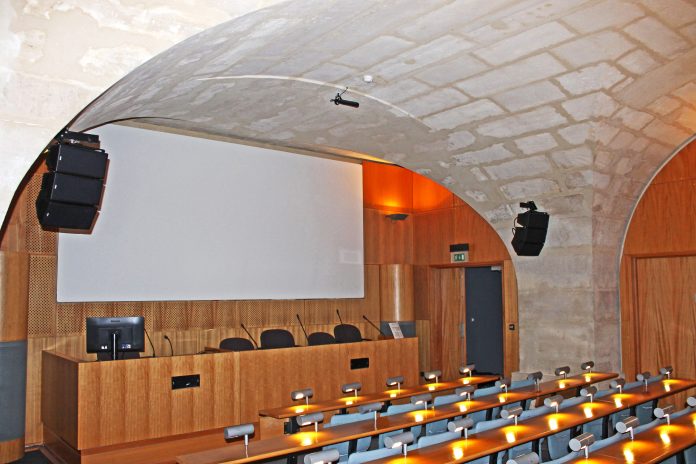The Ecole du Louvre is a prestigious higher education institution, an important institution within the art history world for situates within the renowned Louvre museum, Paris. Founded in 1882, the school was originally dedicated to archaeology but soon expanded to related disciplines such as history of art and anthropology.
With a long-standing tradition of providing lectures to the general public as well as an education to students, the Ecole du Louvre’s four lecture theatres play a vital part in the school. AV installation company Lagoona Lyon was chosen to renovate the audio specification for these amphitheatres, choosing a mix of NEXO and Yamaha elements to create a visually low-profile high-performance technical standard for the Ecole.
Astell Design, specialists in large-scale installations were in overall charge of the renovation of the four theatres. Consultant Rémy Bréan describes her intentions as attempting to offer the latest technologies available in the world of live shows and events. Yet, as paradoxical as it may seem, our specifications have been based on the same requirements as the acoustic reinforcement for an artist’s live performance. Our aim was to broadcast as discreetly as acoustically possible, giving our pupils a comfortable listening room to limit auditory fatigue over the duration of their teaching.”
The Lagoona team, led by managing director Frédéric Bezard, was tasked with designing a sound reinforcement system that would guarantee excellent speech intelligibility at low volume but which could also be beefed up with additional subwoofers for extra output. Additional challenges awaited the installation team as The Ecole is housed in one of the most famous buildings in the world and so modification of cable conduits and loudspeaker mounts was out of the question, therefore new loudspeakers therefore to take the place of former ones. In addition, Lagoona turned to two new compact enclosures recently released by NEXO: GEO M6 compact line array and the uber-compact ID24 point source modules as the ideal replacement.
The four lecture theatres are Michelangelo (180 seats), Cézanne (160 seats), Goya (140 seats) and Dürer (113 seats). A variety of systems have been designed to suit the different spaces, using a total of 36x GEO M620 line array modules as the principal loudspeaker. In the main amphitheatre, the wood-panelled Michelangelo, Lagoona was asked to provide a system appropriate for teaching and lecture classes as well as film screenings and musical entertainment. The primary system features 4x GEO M620 line array modules per side where an additional 4x M620s are positioned for the rear of the room to play the surround channel for 5.1 channel film projection and 4x ID24 über-compact full-range speakers for front fill. Two LS600 subwoofers are subtly hidden in the corners and additional LS18s can be brought in on dollies if necessary. In the rack is a combination of classic NXAMP4x1 and NEXO’s new DTDAMP with DTD controller.
In the Cézanne, which is 20-metres deep, the installation comprises 4x GEO M620 compact line array modules per side with another 2x M620 cabinets for front fill. As explained by Jean Jacques Vias, NEXO sales manager for France, he insists that, “A column of 12 modules operating in a reverberant environment, we would expect GEO M6 to cover 35-40 metres. Here the line of four cabinets couples to form a cylindrical wavefront. The output from 4 modules carries easily to the end of the Cézanne room.” After careful consideration of the room’s acoustics and spaces two LS18 subs have been placed at the back of the stage.
In the Goya, an atmospheric vaulted room with stone walls and wooden acoustic treatment and once again, the loudspeaker modules are GEO M620, three per side. Three ID24 modules are used for front fill and another pair of IDs for monitoring. LS18 subs can be added if required and the whole room’s SR is run off a single NXAMP4x1 amplifier.
In the Dürer, another vaulted cellar, a similar system of 3x M620s per side plus single M620s placed 2/3 of the way through the room to cover the last 8-metres of seating. 2x ID24s cover frontfill, a pair of M620s provide monitoring and the whole system is run off one NXAMP4x1.





